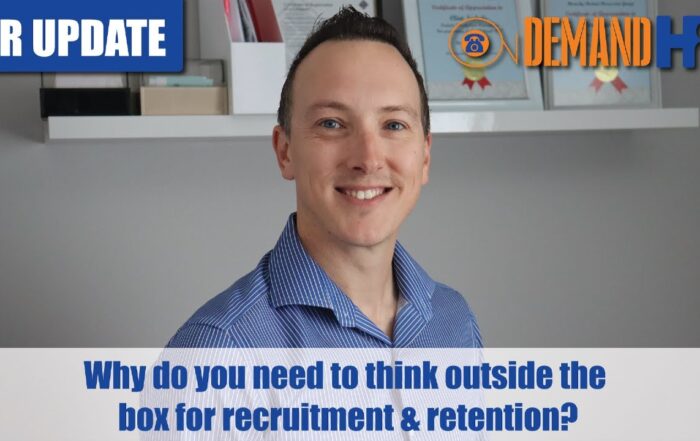Tips & Strategies For Moving an EBA Negotation To Conclusion
EBA negotations can drag on for months and sometimes even longer. In many cases this is not a positive outcome for the business or the employees. In this extract from a longer presentation, Clint Indrele Managing Director of On Demand HR shares some tips and strategies for bringing an EBA negotiation to conclusion quickly and effectively.
Please see below for a full transcript of the video.
Share the HR or workplace relations challenge facing your business and one of our experienced consultants will be in touch within 24 hours with a strategic action plan or discover the best strategy yourself by accessing out free online training library.
Transcript
0:02
The last part of it. So once we’ve had a number of, you know, negotiation meetings with the union, moving the enterprise agreement to conclusion is another very important part of the process.
So once you’ve given the union response to their claims, put forward the skeleton agreement say this is the agreement, we’re proposing, with the things that we’ve agreed to, and really almost say to them, right, we’ve agreed to do some of these things we’ve not agreed to others. This is the proposed agreement. Here it is, and really put the not put the pressure but put the onus thing back on the union to say, We want this to move forward quickly.
We will, we will give your employees increases from this date, if we can agree to this by this date. If they don’t, if they want to drag things out, well then make it clear that we’re not going to backdate indefinitely, any any new increases. So eliminate the eliminate the incentive for unnecessary or unreasonable delay on the part of the Union. So that that’s another good tactic.
Consider your lodgement requirements in advance, there is the notice of employee rights, you must issue to every employee, there are voting requirements, you generally need to provide the agreement to employees at least seven days before the vote. And you can’t, you can’t essentially enter into any agreement for the enterprise agreement, at least 14 days after the first notice of employee representational rights was issued, practically you’re never gonna do that anyway. But that’s another timeline requirement around this.
The other thing I’d recommend you do in these situations is appoint a bargaining representative, we act as a bargaining representative for many employers in in negotiating enterprise agreements. And the reason we recommend that is because if you’re doing it, if you’re kind of juggling this with your day to day jobs internally, Well, number one, do you have the expertise? But number two, are you really going to move the EBA along in a constructive and timely manner? So that that’s another part of it, that’s quite important.
Once you’ve done all of that lodge with the Fair Work Commission, and obviously respond to their queries accordingly, the commission that’s assigned to the matter, look at the agreement, they’ll look at the better off overall test and make a judgement on whether or not they think that, you know, the agreement should be approved. So that is a bit about enterprise agreement. Enterprise agreements and look, I know that that might be unfamiliar territory. For some of you here today, maybe you’ve never encountered an enterprise agreement before. But yeah, they are very common, they’re very common in in an NFP’s, so it’s good to understand at least that planning phase, the negotiation phase, and moving into conclusion, so that if you ever, you know, encounter this, you’ve got some knowledge about some, you know, what, what’s involved.
So, before I move to this part about mask, I’ll just gonna say if there’s anyone got any questions? Yes, James? The short answer is there isn’t one? And the short answer is that look, in theory, what an enterprise agreement does, it can create flexibilities for employers, you don’t have to follow the Modern Award terms per se. But you do need to be better off overall. So ultimately, ultimately, if you, if you have a flexibility in the agreement that’s different from the award, you kind of need to make up for it somewhere else. So whether that’s higher wages or things like that, that might be the that that might be the way of doing it. Look, my view on enterprise agreements is probably fairly negative in the sense that I see them as a, they’re a necessity in some points. But it’s not something that I would ever proactively go out and do unless I’m a construction business who wants to get on bigger sites. Unless I’m an organization that’s already got one and inevitably I’m going to, you know, you once you’ve got an EBA, you’ve got it for life, essentially, because you’re gonna have to renegotiate it, the chances of getting an EBA terminated, very, very difficult in this in, you know, in any situation, Why would an employee or a group of employees one agreed or terminated an enterprise agreement just to go back to the old conditions? even if it was with a, you know, a promise that the rates would still be the same. So, so the reality is you’re dealing with circumstances where you’ve either got an enterprise agreement, you’re forced into one because of a majority support determination, or you are a construction business that wants to get on your principal contractors books for big projects, and, and in order to appease them as a business necessity you need to have one.






